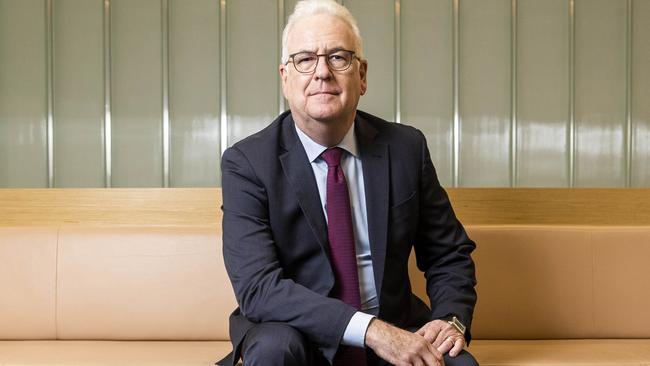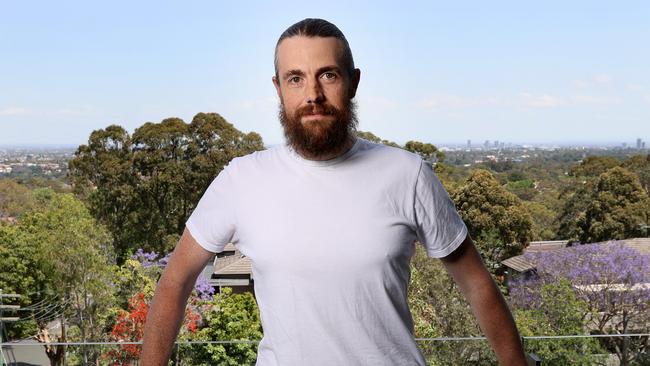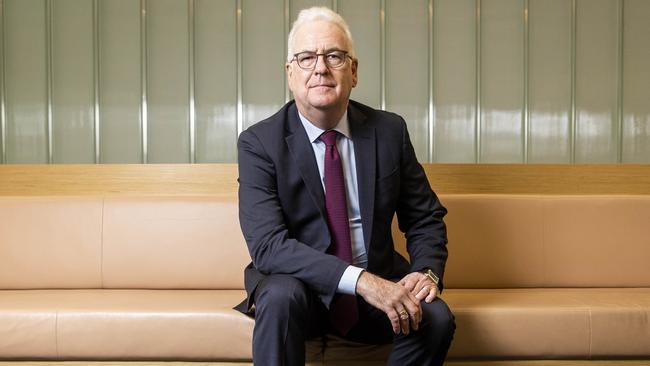AGL, Cannon-Brookes at war over demerger deal
AGL Energy has unveiled a giant renewables investment from Global Infrastructure Partners and attacked billionaire Mike Cannon-Brookes’ plot to block its demerger plan.

AGL Energy chief executive Graeme Hunt has attacked Mike Cannon-Brookes for the tech titan’s plot to block the company’s demerger, warning the billionaire had no strategic vision and the energy giant would not be engaging with its largest shareholder.
“What we’ve heard overnight ... is a lot of rhetoric but really no plan,” Mr Hunt said on Tuesday.
“He said he wants the demerger not to go ahead, but then he will sort out what direction the company should go in later.
“It’s really a choice between a plan that the company has worked on for over a year, which included looking at a whole host of various options and not just a single-minded approach towards the demerger ... against someone who has got no plan.”
Mr Cannon-Brookes said he expected AGL’s restructure to be voted down, forcing the entire board of the power giant to quit.
The billionaire has amassed an 11.28 per cent stake in AGL and said the position of the board – led by chairman Peter Botten – would be untenable should he succeed in voting down the deal.
“It would be hard for them to stay in place,” Mr Cannon-Brookes told The Australian.
“It’s a board and a management team which has presided over a 70 per cent loss of shareholder funds in five years. It’s a board that said they didn’t see renewables coming at this pace. Really? You’re the largest energy retailer in the company and you didn’t see renewables coming. What sort of answer is that.”
The Atlassian co-founder said he knows of many major shareholders who share his frustration with the proposed demerger, which he expects will be defeated at a June 15 investor vote.
“I think they will (vote it down). From the shareholders I’ve talked to, AGL is facing a giant uphill battle to convince people that this is a good idea.

“I suspect we’ve made that battle a little bit harder in what was already probably going to be an uphill battle.”
So far, two AGL shareholders are backing Mr Cannon-Brookes’ plan to reject the demerger.
London-based activist investor Snowcap said “abandoning the demerger and keeping AGL together as a public company is the best path forward for all stakeholders”. It said in a statement: “After speaking with management, we came away even more convinced that there is no compelling rationale for splitting the company in two.
“The latest development is the nail in the coffin for the demerger plan. Management should now call off the vote as soon as possible to avoid further time or resources going to waste. Hopefully this will mark the first step in correcting AGL’s course, but there is a lot more work to be done. We remain committed as shareholders in advocating for an accelerated transition away from coal.”
Superannuation fund HESTA also indicated its support for the billionaire’s plan. “HESTA is unlikely to support the demerger unless we see a clear strategy to invest in renewables and storage, and strong commitments to close coal-fired power plants earlier than currently proposed,” the fund said in a statement.
“AGL should also provide investors with some certainty that the demerger will not result in emission-intensive assets being taken off listed markets and their lives extended.”
Mr Cannon-Brookes, who used his family investment group Grok Ventures to buy the stake, said he intended to remain a long-term shareholder of the company but said his focus was on securing enough shareholder support to defeat the split of the company.
The demerger needs approval from 75 per cent of shares voted at the June 15 meeting to proceed.
“We can’t do this alone,” Mr Cannon-Brookes said. “But there are certainly other shareholders out there who we know are on our side and previously had no other option. So as of yesterday, there was nothing else for them to vote for or no reason to vote against. And this is us intending to be involved here for a very long time. This is not just we will be here for the vote and that’s it.”
Mr Cannon-Brookes indicated he wanted AGL to accelerate the closure of its coal plants, reprising the strategy that underpinned his rejected takeover approach.
But AGL said that approach could lead to a “nosedive” for investors. “We can do a better transition as two companies than one,” Mr Hunt said. “And if it isn’t a measured transition, and that glide path is too steep, and someone wants to put the company and the transition into a nosedive, then that’s bad for shareholders, and that’s bad for consumers, and bad for employees and communities and everything else.”
Mr Cannon-Brookes indicated in his letter to AGL’s board he would be open to talks to explain his resistance to the demerger.

But AGL said its newest investor would receive no special treatment and could expect a call in line with other shareholders.
“He will be on a list with a whole lot of others from big to small, who we will engage with around the process leading up to the shareholder vote,” Mr Hunt said.
“We will deal with him in a measured way in a timeframe that’s appropriate.”
AGL, which fell 3.1 per cent to $8.35, also landed its own blow after unveiling a giant $2bn deal with Global Infrastructure Partners to develop its renewables and low-carbon business.
AGL has been in talks with partners to establish a scheme called the Energy Transition Investment Partnership, aimed at supporting its coal arm Accel in funding low-carbon developments with a 2700 megawatt pipeline of projects.
The deal hands GIP a 49 per cent equity stake in ETIP, although the deal remains subject to the planned split of the company winning shareholder approval.
AGL’s planned coal offshoot, Accel Energy, aims to develop Loy Yang, Bayswater and Torrens Island into major energy hubs spanning hydrogen through batteries.
Accel and GIP will jointly fund $2bn of equity in ETIP to support the pipeline with the remaining funding needs financed by debt on a project by project basis.
GIP will pay $94m for its 49 per cent holding, which includes an upfront cash payment of $40m to Accel with the balance to be used by Accel to fund its share of the ongoing investment in the development pipeline.
The foundation projects are batteries at its Liddell and Loy Yang coal plants, Bells Mountain pumped hydro in NSW, wind farms at Bowmans Creek in NSW and Barn Hill in South Australia along with two other unspecified wind farms in Victoria and NSW.
AGL said the Bowmans Creek wind farm Loy Yang battery would be the first two projects developed by ETIP with the go-ahead for both projects targeted by the end of 2022.
“If all the Foundation Projects in ETIP were to proceed, it would represent an investment of approximately $4.7bn into the future of energy in Australia,” Mr Hunt said.



